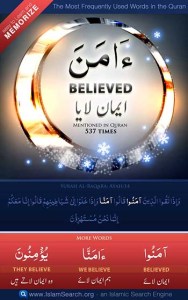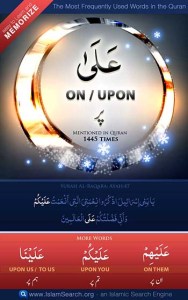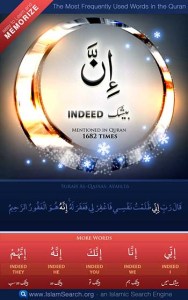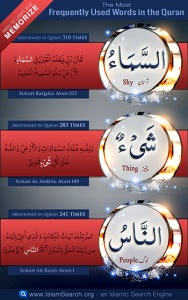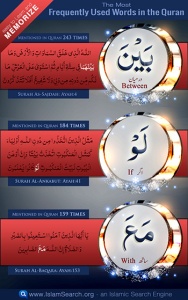Abu Hurairah RA reported: I heard the Messenger of Allah (sallallaahu ’alayhi wa sallam) saying, “There is a Surah in the Qur’an which contains thirty Ayat which kept interceding for a man until his sins are forgiven. This Surah is ‘Blessed is He in Whose Hand is the dominion.’ (Surat Al-Mulk 67).”
(Tirmidhi and Abu Dawud)
Latest Entries »
Credits: Video shared from Islamic Guidance YouTube channel
Immediately upon completing the prayer, it is recommended for the worshipper to invoke Allah (subhanahu wa ta’ala) and to ask for His forgiveness by saying: Astaghfirullah (أستغفر الله) ʾ three times, which means: I seek Allah’s forgiveness.
Immediately thereafter, the worshipper may recite the following supplication:


حَسْبُنَا اللَّهُ وَنِعْمَ الْوَكِيلُ
Allah (Alone) is Sufficient for us, and He is the Best Disposer of affairs (for us).”
–Surah Al ‘Imran (3:173)
In the event of fear and anxiety one should seek the help of Allah and frequently recite this ayah of the glorious Qur’an “Hasbunallahu wa Ni’mal Wakeel” “Allah (Alone) is Sufficient for us, and He is the Best Disposer of affairs (for us).” (3:173).
Ibn ‘Abbas (May Allah be pleased with them) said: When (Prophet) Ibraheem(عَلَيْهِ وَسَلَّم) was thrown into the fire, he said: “Allah (Alone) is sufficient for us, and, He is the Best Disposer of affairs.” So did Messenger of Allah, Muhammad (ﷺ), when he was told: “A great army of the pagans had gathered against him, so fear them”. But this (warning) only increased him and the Muslims in Faith and they said: “Allah (Alone) is sufficient for us, and He is the Best Disposer of affairs (for us)”. [Al-Bukhari].
Abu Sa’id Al-Khudri (May Allah be pleased with him) reported: Messenger of Allah said, “How can I feel at ease when the Angel of the Trumpet, (Israfil) has put his lips to the Trumpet and is waiting for the order to blow it”. He (the Prophet) perceived as if this had shocked his Companions, so he told them to seek comfort through reciting: ‘Hasbunallahu wa Ni’mal-Wakeel [Allah (Alone) is Sufficient for us, and He is the Best Disposer of affairs (for us)]“. (For Arabic Text, read Hadeeth No. 409 here )
If you ask them: “Who created the heavens and the earth?” they will surely answer: “Allah.” Tell them: “What do you think, then, of the deities whom you call upon instead of Allah? If Allah should will that an affliction befall me, will those deities remove the harm inflicted by Him? Or if Allah should will that I receive (His) Mercy, will they be able to withhold His Mercy from me?” Say: “Allah is sufficient for me; those who have to put their trust, let them put their trust in Him. (Surah Az Zumar: 38)
A true Muslim understands very well that Allah alone is the Bestower and Withholder of Mercy, and He alone is the Remover of Harm and Affliction. Reciting Hasbunallahu Wa Nimal Wakeel provides the healing touch that is very much necessary in one’s life.
By putting one’s complete Trust in Allah, by leaving matters unto Him, by seeking only His grace and mercy, by accepting His decree, by submitting to His Will – a Muslim can equip oneself to face the challenges of life.
We have listed Most Frequently Used Words in Quran from website islamsearch.org (Jazakallahu Khairan)
In Sha Allah It will make you little easy to understand while reading/listening Quran.
Note:
We are not teaching Arabic Grammar nor we claim that this is the sole meaning of these words.
We are trying our best to bring you those words with its meaning which are used frequently in the Quran.
The ninth day of Dhul-Hijjah (the 12th and final month of the Islamic calendar) is the Day of ‘Arafah. It is the day when pilgrims stand on the plain of ‘Arafah to pray. On this day, Muslims all over the world who do not witness the annual Hajj should spend the day in fasting, in preparation for the three days festivity following ‘Eid ul-Adha (the celebration marking the end of the Hajj commemorating the Prophet Ibrahim’s willingness of sacrifice).
Abu Hafsah, may Allah be pleased with him, reported that the Prophet, upon whom be peace, said:
“Fasting on the Day of ‘Arafah absolves the sins for two years: the previous year and the coming year, and fasting on ‘Ashura, (the tenth day of Muharram) atones for the sins of previous years.” [Reported by all except al-Bukhari and at-Tirmidhi]
In another saying the Prophet’s wife Hafsah, may Allah be pleased with her, said:
“Four things the Messenger of Allâh never neglected: Observing fast on the day of ‘Ashura, ‘Arafat, three days every month, and offering fajr sunnah prayers early in the morning.” [Muslim]
Fasting on Arafah day is for non-pilgrims. For pilgrims, its prohibited to fast on these days.
“O you who believe! Avoid much suspicion, for some suspicions are a sin. Do not spy on one another, nor backbite one another. Would one of you love to eat the flesh of his dead brother? Nay, you would abhor it, [so similarly, avoid backbiting]. And fear Allah. Indeed, Allah is Most Forgiving, Most Merciful.” Qur’an, [49:12]
“And do not follow that of which you do not have knowledge. Indeed, the hearing, the sight and the heart – [you] will be asked about all of those.” Qur’an, [17:36]
“He does not utter a [single] word, except that there is, with him, [an angel] ready and waiting [to record it].” Qur’an, [50:18]
When you say Allahu Akbar, Subhan Allah, Al hamdulillah, La ilaha ila Allah, you are glorifying your Lord.
“Therefore remember Me (by praying, glorifying). I will remember you.” Quran(2:152)
“And remember Allah much, that you may be successful.” Quran(62:10)
Abu Hurairah (May Allah be pleased with him) reported: The Messenger of Allah (sallallaahu ’alayhi wa sallam) said, “The uttering of the words: “Subhan-Allah (Allah is free from imperfection), Al-hamdu lillah (all praise is due to Allah), La ilaha illallah (there is no true god except Allah) and Allahu Akbar (Allah is the Greatest)’ is dearer to me than anything over which the sun rises.”Muslim
There is a hadith which say: “Whoever glorifies Allaah (says Subhaan Allaah) thirty-three times immediately after each prayer, and praises Allaah (says Al-hamdu Lillaah) thirty-three times, and magnifies Allaah (says Allaahu akbar) thirty-three times, this makes ninety-nine, then to complete one hundred says Laa ilaaha ill-Allaah wahdahu laa shareeka lahu, lahu’l-mulk wa lahu’l-hamd wa huwa ‘ala kulli shay’in qadeer (There is no god except Allaah Alone, with no partner, His is the power and His is the praise, and He is Able to do all things) – his sins will be forgiven even if they are like the foam of the sea.” (Reported by Muslim, 939).
ref: http://www.assimalhakeem.net/what-are-the-benefits-of-saying-the-below-statements-1allah-hu-akbar-2-sub-han-allah-3-allah-hu-akbar-4-la-ilaha-illaah/




